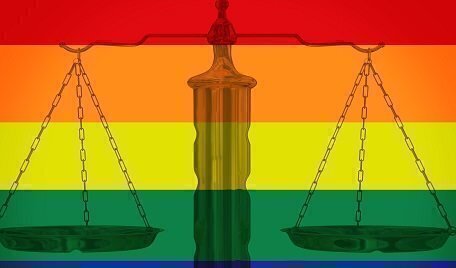Taking its first official stand on the issue, the Trump Administration argued in a federal court Wednesday that a 1964 civil rights law does not protect gays, lesbians and transgender people from discrimination in the workplace. By implication, the position also suggests that the government will not support equal rights under a 1972 law on equality in education programs for LGBT people.
 The views on the workplace law, Title VII, were spelled out in a friend-of-court brief that the Justice Department filed in the U.S. Court of Appeals for the Seventh Circuit, which is considering the issue before its full bench (“en banc”). The full court is reconsidering a long-standing view in that court that parallels the new view of the Trump Administration.
The views on the workplace law, Title VII, were spelled out in a friend-of-court brief that the Justice Department filed in the U.S. Court of Appeals for the Seventh Circuit, which is considering the issue before its full bench (“en banc”). The full court is reconsidering a long-standing view in that court that parallels the new view of the Trump Administration.
The same issue is already on its way to the Supreme Court in a Georgia case, from the U.S. Court of Appeals for the Eleventh Circuit. Although until very recently every federal appeals court to rule on the issue had decided that Congress did not intend to protect against discrimination based on sexual orientation, a split has now developed at that appeals level, a conflict that suggests that the Justices are likely to take up the issue fairly soon.
Title VII, the 1964 law, outlaws discrimination among workers “because of sex.” The 1972 equality-in-education law, Title IX, outlaws discrimination “based on sex” in federally funded school and college programs.
The filing of the government’s brief in the Second Circuit Court came on the same day that President Trump in an entry on his Twitter account announced that the government will not allow transgender people to serve in or enter the military. It is not yet clear whether that view will be translated into official federal policy.
It was not a surprise that the Trump legal team would take a position that existing sex bias laws should be interpreted narrowly, since it had advised the Supreme Court last February that it would no longer enforce the Obama Administration’s view that Title IX protected against discrimination based on “gender identity.”
It said at the time that it was restudying the issue, and suggested that the Obama Administration had not studied the issue in depth before taking its position.
The Trump team volunteered to submit its new Title VII brief in the Second Circuit Court case (Zarda v. Altitude Express); it had not been asked by that court for its views on the issue. The brief was filed at the same time as several others by organizations opposing a broader view of the kind of protection that Congress meant to provide for the sexes.
The position the Administration is now taking conflicts directly with the current view of the U.S. Equal Employment Commission, which has followed a policy for the past two years to include sexual orientation as protected from discrimination under Title VII. The Justice Department lawyers told the Second Circuit Court that “the EEOC is not speaking for the United States and is position about the scope of Title VII is entitled to no deference beyond its power to persuade.”
The new brief has two main themes: first, that it is up to Congress, not the courts, to decide whether to expand civil rights law to protect gays, lesbians and transgender people, and the lawmakers have repeatedly refused to do so, and, second, that there has been until recently a unanimous view among federal appeals courts that Congress had not intended an expanded view of what “sex” meant in federal anti-discrimination law.
Urging the Second Circuit Court not to change its mind on the issue, the new filing argued that the Circuit Court’s “well-established position correctly reflects the plain meaning of the statute [Title VII], the overwhelming weight and reasoning of the case law, and the clear congressional ratification of that interpretation.”
Congress’s only intention, the brief contended, was to protect against discrimination based upon the traditional view of sex – that is, treating individuals differently because of their biological sex.
The brief added as an attachment a two-and-a-half page listing, in small type, of all of the proposed bills in Congress since 1974 that would have expanded the definition of sex in civil rights law to include sexual orientation. The list noted that there are two such bills now pending in Congress.
Although the new filing only deals with the Administration view on the scope of Title VII, that law and Title IX often are considered to have the same meaning. If the government wishes to take a position now on Title IX in a court filing, there is a Virginia case that will be heard in September by the U.S. Court of Appeals for the Fourth Circuit.
That is the same case that, in an earlier phase, had been granted review by the Supreme Court, but was returned by the Justices to the Fourth Circuit Court to take account of the Trump Administration’s change of position. So far, the new government has not indicated that it will enter that case at the appeals court level.
Legendary journalist Lyle Denniston is Constitution Daily’s Supreme Court correspondent. Denniston has written for us as a contributor since June 2011 and has covered the Supreme Court since 1958. His work also appears on lyldenlawnews.com.







